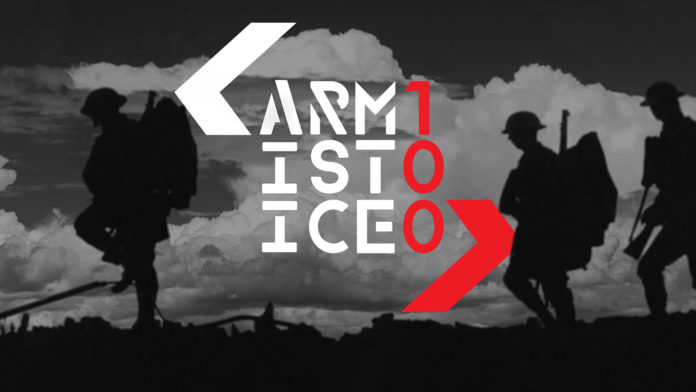One hundred years ago today, at
the 11th hour on the 11th of November
1918, an Armistice was signed and World
War One came to an end. The total number
of people -both military and civilianskilled
in that war is estimated at 40 million!
An accurate estimate is impossible since so
many of they were pulverised in places like
the Somme or eaten by the rats in places
like Passchendaele, in Belgium.
It is hard to say with exact
certainty how many people died in World War 2, but estimates vary
between 50 million to over 80 million. An incontrovertible fact,
however, is that it has been the deadliest war ever, wiping out
around 3 percent of the world population at the time.
Civilians killed by war-related diseases and famine
counted between 19,000,000 and 25,000,000. Because our
neighbours seemed to hijack for themselves ‘the glories of war’ we
tend to forget that most of the fighting took place on French soil.
The death of the young English poet Wilfred Owen has
often been highlighted to epitomise the futility and capriciousness
of that war. Authors often point to the peculiar poignancy that when
the Owens family received the telegram informing them of
Wilfred’s death, the church bells of Shrewsbury rang out in
celebration of victory. His fellow poet A. E. Housman expressed the
ambiguous feelings of the young war poets like Owen:
Here dead lie we because we did not choose
To live and shame the land from which we sprung.
Life, to be sure, is nothing much to lose;
But young men think it is, and we were young.
Today, throughout the western world in particular, political
leaders will lead the nations in homage to people like Wilfred Owen.
In Britain, the Cenotaph forms the focal point. Cenotaph, meaning
an empty tomb, stands for all those who gave their lives defending
western values as they saw it; and its emptiness signposts a hope that
their death is not their end.
November is the season of dying. It begins with Halloween
and moves on through All Saints and All Souls to the Act of
Remembrance. Even nature adds its grieving voice in the cadence of
falling leaves. We are brought face to face with our mortality.
When a person is confronted by a difficult choice you’ll
often hear the advice of a friend, “Well, you only live once” or “You
get just one shot at life”. The gist of the advice is that you have to
make the most of the here and now. There’s little sense that what we
do this side of the grave has any effect on what might happen later.
It’s an issue that early Christians martyrs wrestled with.
Why go through all that cruelty? Why not renounce your faith? It
prompted St Paul to write that if for this life only we’ve put our trust
in Christ, then we are the most miserable of all peoples! It was their
faith in a life beyond that shaped the first Christians’ attitude to death
and how they then lived. Eternity gave them their ethos and their
ethics. In his poem ‘Sailing to Byzantium’ W B Yeats wrote,
“An aged man is but a paltry thing,
A tattered coat upon a stick, unless
Soul clap its hands and sing …”
Whatever we believe about an afterlife, it’s the idea of a
soul that spans the material and spiritual, and helps us contemplate
what truly happens when the seed has fallen into the ground and
died. -Dick Lyng.

